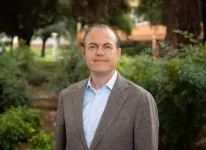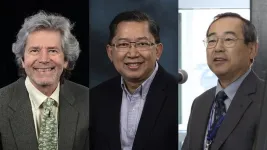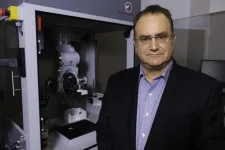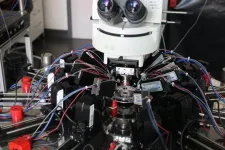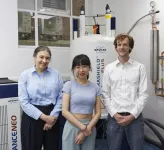(Press-News.org) Kaushik Rajashekara, Distinguished Professor of Engineering at the University of Houston Cullen College of Engineering, continues to receive recognition and awards on a global scale. The man who ushered in the era of electric cars, working on the General Motors EV1 in 1995 when he was a Technical Fellow there, has been elected an International Fellow of the Engineering Academy of Japan, recognized for his contributions to power conversion and, of course, electrification of transportation.
According to the academy, Rajashekara’s election as an International Fellow specifically honors his “outstanding scientific research and scientific-technical developments in the field of energy which promote greater efficiency and environmental security for energy sources on Earth in the interests of all mankind.”
He stands among an elite group of fewer than 10 Fellows from the United States, out of a distinguished group comprising 800 Fellows and 15 International Fellows.
“I am deeply honored to have been chosen as an International Fellow of the Engineering Academy of Japan, a distinction that I hold in high regard. This recognition reflects the longstanding relationships I've cultivated with several esteemed Japanese universities and industries throughout my career,” said Rajashekara, who is also the director of the UH power program PEMSEC (Power Electronics, Microgrids & Subsea Electrical Systems Center).
Originally from a small village in India, Rajashekara has kept Asia close; he is also an International Fellow of the Chinese and Indian National Academies of Engineering.
For over three decades he has worked with Japanese students, engineers and the faculty of several Japanese universities. As the former lead propulsion system engineer for General Motors’ IMPACT electric vehicle and as chief technologist at Rolls-Royce Corporation, he visited Japan often to give seminars at Meiji University among others. He has also visited companies like Toshiba, Fuji, Meidensha, Hitachi and more to establish research and development cooperation.
His reach is wide, his journey impressive. As a youngster who had to read by kerosine lamplight in a one room lean-to with his family of five, his accomplishments are nothing short of awe inspiring.
In 2022 Rajashekara received the most coveted prize in the field of international energy – the Global Energy Prize bestowed by the Global Energy Association. Only three people in the world were selected in 2022 for the honor out of a record 119 nominations from 43 countries. Think Nobel Prize for science or Academy Award for film. That’s the level of the award. He is also a member of U.S. National Academy of Engineering and a Fellow of: The Institute of Electrical and Electronics Engineers, The National Academy of Inventors and The Society of Automotive Engineers.
Naturally.
In fact, as a self-described “futurist,” Rajashekara is confident that flying cars are the next big thing. Given his track record, we'll soon be arguing over who gets the top floor of the sky garage.
END
University of Houston Professor Kaushik Rajashekara elected International Fellow of the Engineering Academy of Japan
UH Engineer Honored for his contributions in the “interests of all mankind”
2024-04-18
ELSE PRESS RELEASES FROM THIS DATE:
Solving antibiotic and pesticide resistance with infectious worms
2024-04-18
To study how parasites evolve to break the defenses of their hosts, the National Institutes of Health has granted UC Riverside nematologist Simon “Niels” Groen a $1.9 million Outstanding Investigator Award.
Roundworm parasites infect humans, livestock, and crop plants. Insights into why certain worms can evade host immune protections could help preempt a ticking time bomb: the decreasing effectiveness of pesticides and antibiotics for infections.
Bacterial, fungal, and parasite resistance to drugs and pesticides is making it harder, and sometimes impossible, to treat common infections ...
Three ORNL scientists elected AAAS Fellows
2024-04-18
Three scientists from the Department of Energy’s Oak Ridge National Laboratory have been elected fellows of the American Association for the Advancement of Science, or AAAS, the world’s largest general scientific society and publisher of the Science family of journals.
"Keith Kline, Rigoberto Advincula and Takeshi Egami have delivered significant impact for the scientific community," said ORNL Director Stephen Streiffer. "This distinguished honor highlights their commitment, hard work and leadership in their respective fields. I offer my congratulations to them on this well-deserved recognition.”
AAAS ...
Rice bioengineers win $1.4 million ARPA-H grant for osteoarthritis research
2024-04-18
HOUSTON – (April 18, 2024) – Bioengineers at Rice University have been awarded $1.4 million as part of a multi-center consortium funded by the Advanced Research Projects Agency for Health (ARPA-H) to develop strategies for reversing the effects of osteoarthritis.
“We’re thrilled to be a part of this collaborative effort to tackle one of the most challenging degenerative joint diseases and develop, test and commercialize solutions for patients,” said Antonios Mikos, the Louis Calder Professor of Chemical Engineering and professor of bioengineering ...
COVID-19 booster immunity lasts much longer than primary series alone, York University-led study shows
2024-04-18
April 18, 2024, TORONTO – Thinking about getting a spring-time booster shot? A new study coming out of York University’s Centre for Disease Modelling in the Faculty of Science shows that immunity after a COVID-19 booster lasts much longer than the primary series alone. These findings are among other, sometimes “unintuitive,” revelations of how factors like age, sex and comorbidities do and don’t affect immune response.
The study’s authors – York Post Doctoral researchers Chapin ...
Bentham Science joins United2Act
2024-04-18
Bentham Science Publishers is now a signatory organization of United2Act's consensus statement on paper mills.
We are committed to upholding the highest standards of research integrity in academic and scientific publishing. Part of the effort to uphold integrity in scientific publishing includes preventing publication from fraudulent 'paper mills' which negatively impact the credibility of research. We fully support the COPE position statement on this critical issue.
The intrusion of fraudulent papers into the publication record not only undermines public trust in research but also poses significant risks to ...
When thoughts flow in one direction
2024-04-18
Contrary to previous assumptions, nerve cells in the human neocortex are wired differently than in mice. Those are the findings of a new study conducted by Charité – Universitätsmedizin Berlin and published in the journal Science.* The study found that human neurons communicate in one direction, while in mice, signals tend to flow in loops. This increases the efficiency and capacity of the human brain to process information. These discoveries could further the development of artificial neural networks.
The neocortex, a critical structure for human intelligence, is less than five millimeters thick. There, in the outermost layer of the brain, 20 billion neurons process ...
Scientists identify airway cells that sense aspirated water and acid reflux
2024-04-18
Scientists Identify Airway Cells That Sense Aspirated Water and Acid Reflux
The new work by UCSF researchers could lead to interventions to prevent pneumonia or treat certain types of chronic cough.
When a mouthful of water goes down the wrong pipe – heading toward a healthy person’s lungs instead of their gut – they start coughing uncontrollably. That’s because their upper airway senses the water and quickly signals the brain. The same coughing reflex is set off in people with acid reflux, when acid from the stomach reaches the throat.
Now, UC San Francisco scientists have identified the rare type of cell responsible ...
China’s major cities show considerable subsidence from human activities
2024-04-18
The land under nearly half of China’s major cities is undergoing moderate to severe subsidence, affecting roughly one-third of the nation’s urban population, according to a systematic national-scale satellite assessment. The findings suggest that within the next century, 22 to 26% of China’s coastal land will have a relative elevation lower than sea level, putting hundreds of millions of people at elevated risk of flooding due to sea-level rise. Over the last several decades, China has experienced one of the most rapid and extensive urban expansions in human history. This massive wave of urbanization may be threatened ...
Drugs of abuse alter neuronal signaling to reprioritize use over innate needs
2024-04-18
Drugs of abuse, like cocaine and opioids, alter neuronal signaling in the nucleus accumbens (NAc), hijacking a key brain reward system involved with the fulfillment of innate needs for survival, according to a new study in mice. The findings provide mechanistic insights into the intensification of drug-seeking behaviors in substance use disorders. Persistent drug use is accompanied by a profound reprioritization of motivations, skewing decision-making behaviors toward a myopic focus on drug use over other innate needs, like eating or drinking water, often ...
Mess is best: disordered structure of battery-like devices improves performance
2024-04-18
The energy density of supercapacitors – battery-like devices that can charge in seconds or a few minutes – can be improved by increasing the ‘messiness’ of their internal structure.
Researchers led by the University of Cambridge used experimental and computer modelling techniques to study the porous carbon electrodes used in supercapacitors. They found that electrodes with a more disordered chemical structure stored far more energy than electrodes with a highly ordered structure.
Supercapacitors are a key technology for the energy transition and could be useful for certain forms of public transport, as well as for ...
LAST 30 PRESS RELEASES:
Roadmap for Europe’s biodiversity monitoring system
Novel camel antimicrobial peptides show promise against drug-resistant bacteria
Scientists discover why we know when to stop scratching an itch
A hidden reason inner ear cells die – and what it means for preventing hearing loss
Researchers discover how tuberculosis bacteria use a “stealth” mechanism to evade the immune system
New microscopy technique lets scientists see cells in unprecedented detail and color
Sometimes less is more: Scientists rethink how to pack medicine into tiny delivery capsules
Scientists build low-cost microscope to study living cells in zero gravity
The Biophysical Journal names Denis V. Titov the 2025 Paper of the Year-Early Career Investigator awardee
Scientists show how your body senses cold—and why menthol feels cool
Scientists deliver new molecule for getting DNA into cells
Study reveals insights about brain regions linked to OCD, informing potential treatments
Does ocean saltiness influence El Niño?
2026 Young Investigators: ONR celebrates new talent tackling warfighter challenges
Genetics help explain who gets the ‘telltale tingle’ from music, art and literature
Many Americans misunderstand medical aid in dying laws
Researchers publish landmark infectious disease study in ‘Science’
New NSF award supports innovative role-playing game approach to strengthening research security in academia
Kumar named to ACMA Emerging Leaders Program for 2026
AI language models could transform aquatic environmental risk assessment
New isotope tools reveal hidden pathways reshaping the global nitrogen cycle
Study reveals how antibiotic structure controls removal from water using biochar
Why chronic pain lasts longer in women: Immune cells offer clues
Toxic exposure creates epigenetic disease risk over 20 generations
More time spent on social media linked to steroid use intentions among boys and men
New study suggests a “kick it while it’s down” approach to cancer treatment could improve cure rates
Milken Institute, Ann Theodore Foundation launch new grant to support clinical trial for potential sarcoidosis treatment
New strategies boost effectiveness of CAR-NK therapy against cancer
Study: Adolescent cannabis use linked to doubling risk of psychotic and bipolar disorders
Invisible harms: drug-related deaths spike after hurricanes and tropical storms
[Press-News.org] University of Houston Professor Kaushik Rajashekara elected International Fellow of the Engineering Academy of JapanUH Engineer Honored for his contributions in the “interests of all mankind”



